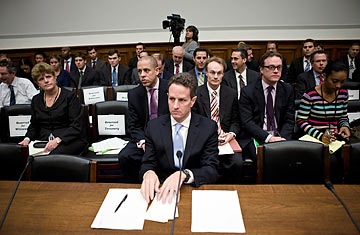
U.S. Treasury Secretary Timothy Geithner testifies at an Oct. 29 House Financial Services Committee hearing in Washington
Last spring when he had just started as Treasury Secretary, Tim Geithner came across as timid, uncertain and a little small in front of the TV cameras and on Capitol Hill. Flash forward to his appearance Thursday morning before the House Financial Services Committee and Geithner was hardly recognizable: he interrupted the members, rolled his eyes, shot questions back, spoke over them and even ignored the chairman himself as he pounded the gavel.
What's got into Geithner? The short answer: a deadline. With their energy bill stalled, health care dragging out and other initiatives pushed aside, financial reform is a high priority for an Administration in search of wins. Geithner's bosses at the White House are pushing to get a bill to the President for his signature by the end of the year, and Geithner is the point man in making that happen.
He's been busy. On Wednesday, Geithner and White House chief of staff Rahm Emanuel met with House Democrats on the Financial Services Committee, pushing them to accept the deal Geithner had negotiated with committee chairman Barney Frank, which includes new powers for regulators and the Federal Reserve to limit risk among the nation's biggest financial institutions, and to dissolve those institutions in an orderly way if they fail. At the same time, the Senate is moving ahead with its own bill, with talk of a markup in Connecticut Senator Chris Dodd's Banking Committee before Thanksgiving. Treasury has even held preliminary discussions with Dodd and Frank staffers about how to meld the two bills, even though both versions remain in flux. Earlier in the fall, Geithner's staff went through their proposals line by line with the Senate Banking Committee's top Republican, Richard Shelby.
Geithner has been working Wall Street too. In the middle of last week he met with a group of top bankers, including Jamie Dimon of JPMorgan, Lloyd Blankfein of Goldman Sachs and others, and told them that while they were welcome to fight his efforts, the political environment was on his side. "In the long run we all need to restore trust in the system," Geithner told the bankers, according to a top aide familiar with the conversation, "People want to see that something's being done."
Geithner has also branched out in Washington, holding regular meetings with top think tankers, academics, journalists and political figures.
Now all he has to do is get a bill passed, and Thursday's reception in the House shows he has a rough road ahead. The committee's ranking Republican Spencer Bachus of Alabama attacked the bill for a lack of transparency, saying he opposed plans to keep secret which banks were subject to the new powers sought by the Administration. A top committee Democrat, Paul Kanjorski of Pennsylvania, said he feared the bill's accumulation of executive-branch power. Regulators are also sniping. At Thursday's hearing in the House, Federal Deposit Insurance Corporation chair Sheila Bair said the Administration's plan didn't give enough power to regulators. Graybeards like Paul Volcker have been calling for greater constraints on big banks.
Seeing the size of the fight he faces may help explain why Geithner was so outspoken on the Hill Thursday. "Now that we have hammered out an agreement with Frank," says the top aide, "it's time to defend it." Geithner's biggest advantage is that the politics of reform are on his side, as he told the big bankers last week. Americans aren't much interested in details, but any appearance of moving forward on reform will have support, while those who try to slow the Administration down will appear to be siding with the big banks and Wall Street. That view is supported by a new TIME poll conducted in association with research firm Abt SRBI, which shows that 62% of Americans believe financial reforms need to be toughened.
Geithner's gamble is that he can leverage that political advantage to rush a bill that will restructure much of the financial system of the United States in a matter of months. It will be a big win for the Administration if he does, as long as the hurried result actually helps, not hurts, financial stability.
